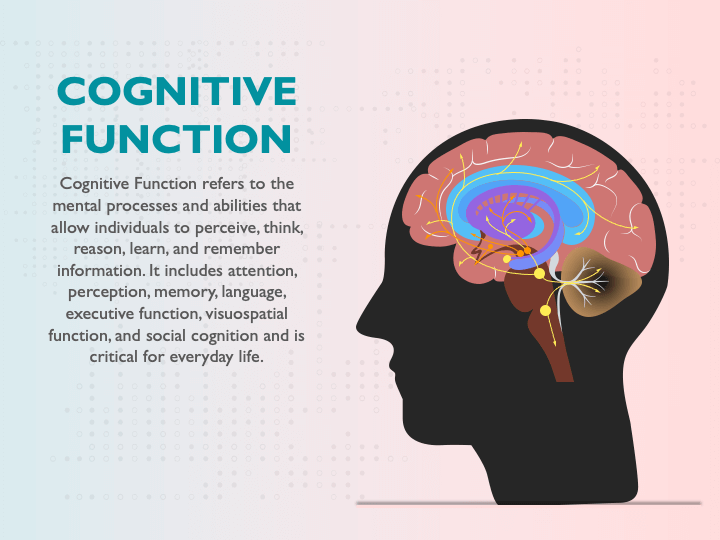How to Improve Cognitive Function
Introduction
Cognitive function includes mental processes, namely attention, memory, problem solving and decision making. Cognitive functioning ought to be maintained and improved for general well-being and quality of life. This article explores a range of strategies aimed at improving cognitive function, among them: lifestyle changes, mental exercises, nutrition and other scientifically-backed approaches.
Understanding Cognitive Function
Cognitive functions provide the basis for the execution of any task whether simple or complex. These processes include;
1. Attention: The capability to concentrate on specific stimuli.
2. Memory: The ability to store information permanently in one’s brain as well as retrieving stored information in future when needed.
3. Executive Function: Skills that help us to plan our actions and make decisions that are appropriate as well as solve problems and control our impulses.
4. Language: The process of understanding how language is used as well as using it correctly.
5. Visual-Spatial Skills: Capability of comprehending the spatial relations between objects and also remembering them.
It is important to maintain or enhance cognitive function throughout life but more so in old age.
Changing your Lifestyle For Enhancing Your Cognitive Abilities
1. Regular Exercise
Life style has a major effect on cognitive health. Regular exercise increases cerebral blood flow, leads to growth of new neurons and enhances brain plasticity. Both aerobic exercises such as walking, running and swimming and also strength training are helpful in this regard. Likewise, activities which involve coordination and balance, like dancing or yoga have been shown to help in cognition.
2. Adequate Sleep
Sleep is essential for cognitive functioning. It is during sleep that the brain consolidates memories, washes out toxins and rejuvenates itself. Poor sleep can affect attention, memory and executive function. Aim for 7-9 hours of good quality sleep every night and maintain a routine sleep schedule.
3. Stress Management
Chronic stress may negatively impact cognitive functions , especially memory and executive functions . Techniques for managing stress such as mindfulness meditation , deep breathing exercises ,yoga among other activities can assist in reducing stress levels while at the same time making an improvement on one’s general state of mental health .
4. Social Engagement
Social interaction stimulates cognitive function by challenging the brain with new experiences and perspectives. Participating in social activities, maintaining friendships, and participating in community events can enhance cognitive health.
Mental Exercises to Boost Brain Function
1. Brain Training Games
They are designed to challenge different types of cognitive faculties such as memory, attention, problem solving and many others. Lumosity, BrainHQ, Peak among others have a range of exercises aimed at helping improve cognitive capabilities.
2. Learning New Skills
Developing new skills can increase cognition by creating new neural connections. The brain is stimulated and cognitive abilities improved when one learns a foreign language, plays a musical instrument or takes up a hobby.
3. Reading and Writing
Vocabulary improvement; critical thinking enhancement and the comprehension capability are some of the ways through which regular reading and writing improve cognitive function. One can keep their minds active by engaging in various literature genres or writing in their diary or blog.
4. Puzzles and Games
Memory improvement; problem-solving ability; strategic thinking enhancement are some benefits that come along with activities like crossword puzzles, Sudoku, chess, board games among others. These games provide mental stimulation while promoting cognitive flexibility.
Nutrition and Cognitive Function
1. Well-Balanced Diet
For optimal brain health, a well-balanced diet is very important. Nutrients such as omega-3 fatty acids, antioxidants, vitamins and minerals play an essential role in cognitive function. Brain health can be supported by diets rich in fruits, vegetables, whole grains, lean proteins and healthy fats.
2. Omega-3 Fatty Acids
Omega-3 fatty acids are essential for brain health; they are found in fatty fish like salmon, mackerel and sardines and also flaxseeds, chia seeds and walnuts. They promote neurogenesis hence support cognitive function by reducing inflammation in the brain.
3. Antioxidants
Antioxidants protect the brain from oxidative stress caused by free radicals that damage it. Foods rich in antioxidants such as berries, dark chocolate, nuts and green leafy vegetables can help improve cognitive function.
4. B Vitamins
B vitamins particularly B6, B12, folic acid are crucial for the brain’s health: they reduce homocysteine levels associated with cognitive decline. Sources of B vitamins include leafy greens such as spinach and lettuce legumes like beans eggs milk meat poultry fish fortified cereals.
5. Hydration
Staying hydrated is important for maintaining proper cognitive function because dehydration can impair attention memory executive functioning. Drink at least eight glasses of water every day so that you stay hydrated.
Cognitive-Enhancing Supplements
1. Ginkgo Biloba
Ginkgo biloba is a popular herbal supplement believed to enhance cognitive function by improving blood flow to the brain. Some studies suggest it may help improve memory and cognitive speed, particularly in older adults.
2. Bacopa Monnieri
Bacopa monnieri is an herb traditionally used in Ayurveda medicine to improve cognitive function. Research indicates it may enhance memory, attention, and processing speed.
3. Phosphatidylserine
Phosphatidylserine is a phospholipid that is crucial for maintaining healthy brain cell membranes. It has been shown to improve memory, cognitive function, and mood.
4. Acetyl-L-Carnitine
Acetyl-L-carnitine is an amino acid that supports energy production in brain cells. It may improve cognitive function, particularly in older adults, by enhancing memory and reducing mental fatigue.
The Role of Mental Health in Cognitive Function
1. Managing Depression and Anxiety
Depression and anxiety can significantly impair cognitive response structure of the patient’s mind should be understood before prescribing any medication treatment plan Cognitive enhancement starts with the therapist understanding how depression and anxiety are diagnosed Treatment of these conditions through counselling drugs or well-being alterations will make mind process better.
2. Mindfulness and Meditation
Mindfulness meditation practices can enhance cognitive function through attention improvement, memory, and executive functioning. For instance, mindfulness meditation is associated with increased plasticity on the brain and its improved efficiency.
Cognitive Rehabilitation and Therapy
1. Cognitive Behavioral Therapy (CBT)
Cognitive-behavioral therapy (CBT) is a focused, goal-oriented psychotherapy that addresses negative cognition patterns as well as behaviors which helps to improve cognitive function. This makes CBT particularly effective for individuals suffering from cognitive defects arising from anxiety or depression.
2. Cognitive Remediation Therapy (CRT)
Cognitive remediation therapy (CRT) is an intervention strategy aimed at enhancing cognitive abilities through target exercises and strategies. It is frequently used for people experiencing brain injuries or mental health conditions resulting in cognitive disorders.
The Impact of Technology on Cognitive Function
1. Positive Effects
Technology can have positive impacts on cognitive skills by providing such things like games meant to train the brain, educational content, social networks among others. Online courses, virtual reality experiences, and interactive apps stimulate learning capacities in line with stimulating lifelong learning processes.
2. Negative Effects
Too much usage of technology, especially scrolling through social media has been linked to the decreased attention span and a rise in sedentary living; hence, it may lead to cognitive impairment. It is important that we use technology conscientiously and balance screen time with other intellectually stimulating activities.
The Importance of a Cognitive-Friendly Environment
1. Creating a Stimulating Environment
A cognitively enriching environment can help improve cognitive functions. Keep yourself surrounded by books, puzzles and other such things which keep your mind busy. Have discussions, debates or even engage in tasks that stretch you mentally.
2. Reducing Distractions
Distractions can be reduced so as to facilitate better focus on an individual’s cognitive function when carrying out any task. Dedicate a workspace that is free from clutter and do away with any kind of interruption that may emanate from technological gadgets among other sources.
Cognitive Function Across the Lifespan
1. Childhood and Adolescence
Childhood and adolescence are periods characterized by increased brain plasticity and receptiveness to new learning experiences. Encouraging education, physical activity, and social interaction during these formative years can promote optimal cognitive development.
2. Adulthood
In adulthood, maintaining cognitive function requires a balance between family, work and social commitments. It is crucial to maintain good cognitive health by continuous learning, exercises, stress reduction and prudent living.
3. Older Adulthood
However, elderly age can have an impact on cognitive function decline but can be improved through involvement in cognitively demanding tasks. Older people’s mental welfare is maintained through lifelong learning, societal relationship, physical activities and eating right.
Conclusion
Boosting brain activity involves several changes in lifestyle such as doing mental exercise, proper nutrition and supportive environment. Taking a holistic approach towards brain health enables individuals’ minds to become sharper, life to become better and the chances of developing long-term brain problems reduced.
Also it is important to note that you can start making some changes for your cognitive processes at any age. These strategies are not only helpful for your academic performance but also they help professionals or retirees to keep their minds sharp even when they retire because they still remain active mentally throughout their lives.


























